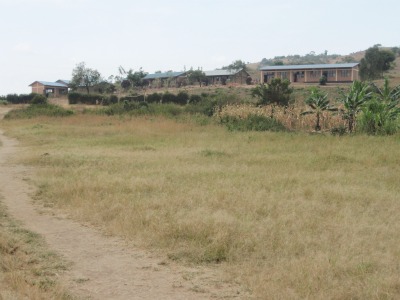JICA-RI Researcher Visits Burundi and Rwanda to Examine Land Conflicts
2012.03.14
Senior Research Fellow Shinichi Takeuchi visited Burundi and Rwanda from January 3 to February 20, 2012 as part of JICA-RI's research project, “Land and Property Problems in Post-Conflict State-Building and Economic Development.”
Burundi: Risk of Land Disputes Being Interpreted as Ethnic Conflict
For this project, a survey on land conflicts covering 270 households is being conducted in the provinces of Makamba, Bururi, and Gitega in Burundi. The objective of the survey is to examine the actual conditions of Burundi’s land conflicts, and note any regional differences. During this field trip, Takeuchi worked with the surveying agency there to verifying responses of the questionnaire and supervise the data entry process.
A provisional analysis of the survey results revealed the following facts:
1) Regional differences exist in people's experiences of “displacement.”
A great number of people in Makamba Province, and in the Rumonge commune of Bururi Province, have experienced displacement. Most land-related disputes in these areas stem from the forced migration. Meanwhile, relatively few people in Gitega Province and Bururi Province (aside from the Rumonge commune) have been displaced. This fact directly influences the differences in the nature of land conflicts.
2) Regional differences also exist in the nature of land disputes.
While the majority of land issues in Makamba are related to returning refugees, roughly two-thirds of all land conflicts in Gitega are caused by disputes over inheritance rights. In Bururi Province, nature of land problems tends to be mixed: inheritance issues are the leading cause of land disputes, accounting for a third of all land conflicts; boundary disputes with neighbors and conflicts relating to returning refugees are, however, also relatively common there; in some cases, land was transformed into oil palm plantations by the government while the owners were absent seeking asylum.
“Differences in the nature of land disputes can be understood better if you look into the history of armed conflict in Burundi,” Takeuchi points out. “The mass killings of 1972 and 1993 are significant events, as they created a massive number of refugees and internally-displaced persons (IDPs).”
The 1972 mass killings of civilian Hutus by the Tutsi-dominated army have often been described as genocide. Many people were victimized and forced to flee from fear, particularly from Makamba Province, whose Nyanza-Lac commune was the site where the atrocities started, and the neighboring lakeside commune of Rumonge in Bururi Province. Meanwhile, in 1993, the assassination of democratically-elected Hutu president Melchior Ndadaye threw the whole country into a civil war and Tutsi civilians were attacked in rural areas and became IDPs.
3) Traditional conflict-resolving systems are the first measure residents rely on to settle disputes.
The survey revealed that the residents first turn to local conflict-resolving institutions called “bashingantahe” and the chiefs of colline -- the smallest administrative unit in Burundi. Basingantahe is a circle of respected community elders responsible for conflict resolution, and is the traditional system within Burundian society. It is only after this step that they bring the issues before higher-level administrative bodies such as communes and provinces, or in some cases, courts (first hearing) and the CNTB (“Commission Nationale des Terres et autres Biens,” established to determine land disputes).
“It is common for the basingantahe and colline chiefs to demand money in exchange for arbitration. When the ruling is not in their favor, or they lost the case, people tend to believe they lost because the other party had offered more bribes,” Takeuchi points out, saying that the conflict-resolving institutions that the local residents first rely on do not always function smoothly.
Some donors are following the experience of Rwanda and supporting the issuing of land certificates in Burundi. However, Takeuchi stresses that issuing land certificates is not enough to settle land disputes and says, ”The crucial point in preventing conflict is to promote the mediation of land disputes prior to, or at least in parallel with, issuing these land certificates.”
Rwanda: How the Rapid Land Registration Affects the Society

Electricity is installed at the rural villages.(Rwanda,eastern region)
While in Rwanda, Takeuchi conducted intensive surveys among the rural villages of the country’s eastern region to examine the process of land registration and local living conditions.
The government of Rwanda has launched the process of land registration in all over the country since 2009. Backed up by donors like UK, the process has rapidly proceeded to date. Land registration is one of the fundamental factors of economic development, as attempts of land titling have been made in many developing countries. In African countries, however, they have not generally resulted in expected consequences to date. With its tiny country size, Rwanda has a possibility to successfully carry out the land registration in all over the territory, which will surely make great impacts on the society. It therefore deserves a close look.
It is too early to evaluate the impact of land registration, but Takeuchi discovered that there has been a general improvement in people's living conditions in the research site. Takeuchi, who has been conducting surveys in this area since 1999, describes his impressions: “The development of the health sector (the distribution of mosquito nets and medication and the promotion of health insurance), free education, and social stabilization, has enabled many people to say that their lives are better than before. This was a pleasant surprise.”

A Jr high school built recently.(Rwanda,eastern region)
Meanwhile, Takeuchi is a bit concerned about see how the government's approach to enforcing policies, as can be seen in its compulsory monoculture farming policy and the “anti-thatch campaign” (a policy to eradicate all thatched roofs), will affect the people’s perception of the government. “There is a shared sense of improving living conditions among the people, and no signs of strong resistance towards these enforced policies. But circumstances could turn them into a cause of discontent towards the government,” Takeuchi observes.

事業事前評価表(地球規模課題対応国際科学技術協力(SATREPS)).国際協力機構 地球環境部 . 防災第一チーム. 1.案件名.国 名: フィリピン共和国.

事業事前評価表(地球規模課題対応国際科学技術協力(SATREPS)).国際協力機構 地球環境部 . 防災第一チーム. 1.案件名.国 名: フィリピン共和国.

事業事前評価表(地球規模課題対応国際科学技術協力(SATREPS)).国際協力機構 地球環境部 . 防災第一チーム. 1.案件名.国 名: フィリピン共和国.

事業事前評価表(地球規模課題対応国際科学技術協力(SATREPS)).国際協力機構 地球環境部 . 防災第一チーム. 1.案件名.国 名: フィリピン共和国.

事業事前評価表(地球規模課題対応国際科学技術協力(SATREPS)).国際協力機構 地球環境部 . 防災第一チーム. 1.案件名.国 名: フィリピン共和国.
scroll